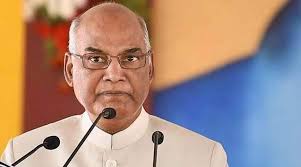NEW DELHI, Sept 23: The high-level committee under the chairmanship of the former president Ram Nath Kovind constituted by the Centre to explore the possibilities of simultaneous elections all over the country, in its first meeting on Saturday decided to invite the political parties and the Law Commission to seek their views on the issue.
The government had, on September 2, notified the eight-member “high-level” panel to examine and make recommendations at the earliest on the issue of holding simultaneous elections to the Lok Sabha, state assemblies, municipalities and panchayats all over the country.
Home Minister Amit Shah, Law Minister Arjun Ram Meghwal, former leader of the opposition in the Rajya Sabha Ghulam Nabi Azad, former Finance Commission chairman N.K. Singh, former Lok Sabha secretary general Subhash C. Kashyap and former chief vigilance commissioner Sanjay Kothari attended the meeting. Noted lawyer Harish Salve joined the meeting virtually.
The Congress’s leader in the Lok Sabha, Adhir Ranjan Chowdhury, was not present in the meeting, the statement noted. After he was named in the committee, Mr Chowdhury had declined to serve in the committee. He had written to Mr Amit Shah, “I have no hesitation whatsoever in declining to serve on the committee whose terms of reference have been prepared in a manner to guarantee its conclusions. It is, I am afraid, a total eyewash,” Mr Chowdhury had said in the letter.
Outlining the modalities of working of the committee, it decided to invite recognised national parties, parties having governments in states, those having their representatives in Parliament and other recognised state parties “for seeking suggestions or view points on the issue of simultaneous elections in the country.”
In addition, the committee will also invite the Law Commission for its suggestions and view-points on the issue of simultaneous elections, according to a statement issued by the union law ministry. The government notification had said the panel would make recommendations “at the earliest” but not specified a time-frame for the submission of the report.
Prime Minister Narendra Modi has been pitching for “one nation, one election” asserting that it will save a lot of money and resources.
The committee will examine and recommend specific amendments to the Constitution, the Representation of the People Act and any other laws and rules that would require amendments for the purpose of holding simultaneous elections.
It has also been tasked to suggest a framework for synchronisation of elections and “specifically suggest the phases and time-frame within which simultaneous elections may be held if they cannot be held in one go….” It will also examine and recommend if the amendments to the Constitution would require to be ratified by the states.
The committee will also analyse and recommend possible solutions to scenarios such as a hung house, the adoption of a no-confidence motion or defection or any such event in case of simultaneous elections. The panel has also been asked to recommend “necessary safeguards for ensuring the continuity of the cycle of simultaneous elections and recommend necessary amendments to the Constitution so that the cycle of simultaneous elections is not disturbed.”
The issue of logistics is also on the agenda of the panel as the massive exercise would require an additional number of electronic voting machines (EVMs), paper-trail machines and polling and security personnel.
It will also examine and recommend the modalities of the use of a single electoral roll and electoral identity cards for identification of voters in elections to the Lok Sabha, state legislative assemblies, municipalities and panchayats.
A parliamentary committee had recently said a common electoral roll will help reduce expenses and prevent manpower being deployed for a work on which another agency is already working.
While the Election Commission (EC) is mandated to hold the parliamentary and Assembly polls, the state election commissions (SECs) hold the local body elections. The EC and the SECs are separate bodies under the Constitution with a fixed mandate.
The original proposal was for simultaneous elections to all three tiers of democracy – Lok Sabha (543 MPs), Vidhan Sabha (4,120 MLAs) and panchayats and municipalities (30 lakh members).
The notification had pointed out that the elections to the Lok Sabha and legislative assemblies were mostly held simultaneously from 1951-52 to 1967, after which the cycle got broken and now, elections are held almost every year and within a year too at different times, which result in a massive expenditure by the government and the other stakeholders.
It also leads to a diversion of security forces and other officers engaged in elections from their primary duties for significantly prolonged periods. Frequent polls, it said, disrupt developmental work on account of a prolonged application of the Model Code of Conduct.
(Manas Dasgupta)

